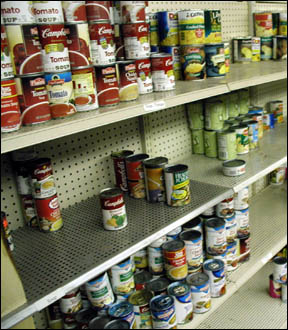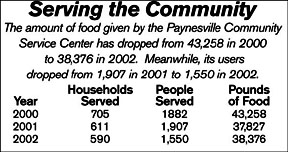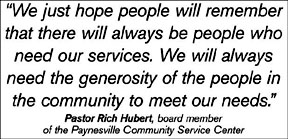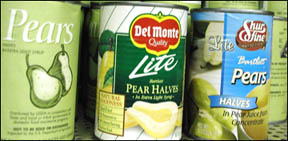Center implements changes in response to concerns
 The board met for nearly two hours last week with local residents Allison Janssen and Donna Platow, who both wrote Letters to the Editor in the Press that were critical of the center.
The board met for nearly two hours last week with local residents Allison Janssen and Donna Platow, who both wrote Letters to the Editor in the Press that were critical of the center.
"I think some good things came out of the meeting," said Margaret Spanier, who recently began serving on the center's board of directors.
The Paynesville Community Service Center hopes to be able to fill its shelves during its food drive this month, despite recent controversy about the operation of the foodshelf. March is its key fundraiser.
"Thank God they came forward," she added.
Among the suggestions, according to minutes from the meeting, were: to label soaps and other nonfood items; to try to get a handle on outdated food items; to make a schedule of volunteers so they can be rotated more effectively; to make applications for volunteers to have on file; to have volunteer training sessions; to put in place a more anonymous system of filling orders; and to get more volunteers.
One change that has already been implemented is the labeling of bottles of soap, fabric softener, and bleach. Before, these were being distributed by the center to clients in unmarked bottles.
Another change to be implemented is to have food orders filled anonymously. Social Security Numbers of the clients are required by Second Harvest Food Bank, noted director Donna Toney, so the clients' name and Social Security Number will still be required.
But instead of announcing the name of the recipients, volunteers would just know that they are filling an order for a family of three, not for a specific family. This would eliminate any volunteer prejudice, even if done unconsciously, the board feels.
If the Paynesville Lions Club is successful in buying or constructing a new building for the center, volunteers could fill orders in advance and give them out on the basis of the size of the family, said Toney.
The center will also try to get more volunteers, will require volunteers to have an application on file, and will try to rotate its volunteers. The switch to some evening hours - began in August 2002 - could help enable more people to volunteer at the center.
The center has great volunteers, and the board is thankful to have them, added Hannah Voss, who also recently started on the board of directors.
 Another concern raised to the board was the distribution of outdated food items. After her letter appeared in the Press, Janssen collected a series of food items that she said were given to her by four clients of the center. (From this, she learned that juice that she thought was syrupy was really concentrate.)
Another concern raised to the board was the distribution of outdated food items. After her letter appeared in the Press, Janssen collected a series of food items that she said were given to her by four clients of the center. (From this, she learned that juice that she thought was syrupy was really concentrate.)
Among the items Janssen collected were boxes of macaroni and cheese that were nearly 18 months out of date, and boxes of rice dishes that were three months out of date.
The board, however, expressed skepticism about the authenticity of some of these items.
In an interview, Janssen maintained that she was just trying to bring these problems to light. "I have nothing to gain in this," said Janssen, whose letter started the recent controversy surrounding the center. She felt the board listened to their concerns at the meeting last week, but she also was somewhat skeptical as to whether all the necessary changes would get made at the center.
Getting nearly out-of-date food is a common problem for foodshelves, said Sue Kainz of Minnesota FoodShare, which conducts fund raising and educational campaigns for foodshelves across the state and works closely with Second Harvest Food Bank, which actually supplies foodshelves in Minnesota.
People making donations should realize that giving to a foodshelf is more than just cleaning out your cupboards, said Kainz. If you would not eat it yourself, don't give it to a foodshelf, which may have to pay to throw the item away. "We're constantly telling people: Don't give old food," she said.
"I don't think we give anything here that I wouldn't feed my family," said Toney. If anyone gets something that they do not want or will not use, they can give it back to the center, added Toney.
 In addition to outdated food, critics have claimed that the center gave away clothing in need of mending.
In addition to outdated food, critics have claimed that the center gave away clothing in need of mending.
It's not the policy of the center to give away clothes that need mending, but some things can get missed, said Pastor Rich Hubert, who is in his second year of serving on the board of directors, representing the Paynesville Ministerial Association.
Another change that the board of directors may consider is not to allow volunteers from receiving food or other items on the same day that they volunteer. Volunteers do not fill their own orders, said Toney, who is paid to be the director.
That volunteers cannot be recipients used to be a rule at the center. It still is pretty standard statewide, according to Kainz. The exception, she said, is where foodshelves have difficulty getting enough help from volunteers.
The controversy surrounding the Paynesville Community Service Center comes during March, its prime month for donations. The center needs nonperishable food, and it also needs cash donations to meet its operating expenses and to buy food and other items to give out.
"We just hope people will remember that there will always be people who need our services," said Pastor Hubert. "We will always need the generosity of the people in the community to meet our needs."
"We are really dependent on the community," added Toney. "The needs are here."
The economic downturn since 9/11 has cut corporate and business donations to foodshelves statewide, said Kainz. At the same time, visits to foodshelves in Minnesota have increased 15 percent during the last two years. Some foodshelves have seen usage up 50 percent and the vast majority saw increases of 20 percent, said Kainz.
 For the Paynesville Community Service Center, the lack of food at Second Harvest Food Banks means it can no longer stock its shelves with food that it can buy for 14¢ per pound. Instead, Toney has had to purchase more food at higher prices at retail stores.
For the Paynesville Community Service Center, the lack of food at Second Harvest Food Banks means it can no longer stock its shelves with food that it can buy for 14¢ per pound. Instead, Toney has had to purchase more food at higher prices at retail stores.
The economic downturn since 9/11 has led to less corporate and individual donations to foodshelves, meaning the local foodshelf has not been able to buy as much food at 14¢ per pound from its main supplier.
Still, usage of the Paynesville Community Service Center was down in 2002, contrary to the state trend of more usage. In 2002, the local foodshelf served 1,550 people down from 1,907 in 2001. At the same time, it gave away more food, 38,376 pounds in 2002, up from 37,827 pounds in 2001. Toney said this may indicate that the economy here has been better than the rest of the state.
Critics, though, have charged that some people are not using the center because of the service or out-dated food that they receive.
While the state standard is to provide six pounds of food for three days per month, meaning 18 pounds per person per month, the Paynesville Community Service Center averaged giving over 24 pounds of food per person in 2002. The board hopes that anyone in need will utilize the center. If anyone has an idea or a suggestion for the center, the board urged them to share it with Toney or with a board member - Pastor Rich Hubert, Rose Kortan, Margaret Spanier, Wally Thyen, and Hannah Voss. The board also plans to install a suggestion box at the center.
Contact the author at editor@paynesvillepress.com • Return to News Menu
Home | Marketplace | Community